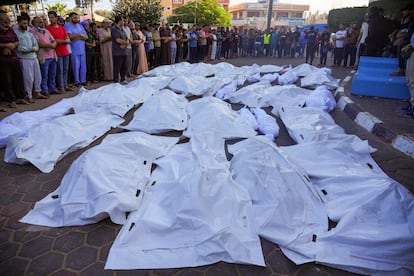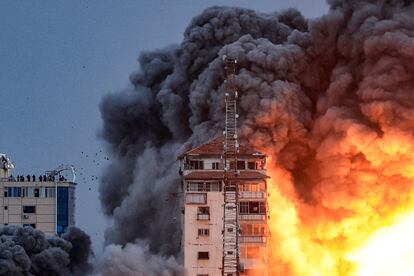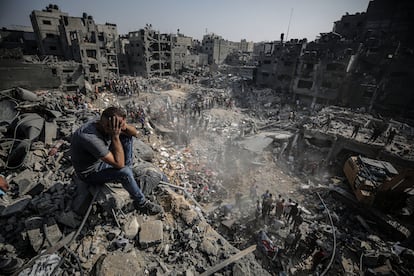One month on from Israel’s siege on Gaza: More than 10,000 dead and an unprecedented trail of destruction
Residents in the enclave are outraged that the international community is not doing more to help, as they describe their daily struggle to survive amid the Israeli offensive against Hamas

“Every day is harder than the last. Everything is a battle, even to get the most basic things,” Rania, a 51-year-old woman employed by a human rights organization, says from Gaza via voice message. That is why she does not understand how — after a month and more than 10,000 deaths later as a result of Israel’s attacks — the international community is not capable of stopping the Israeli offensive. “I say before everyone, before the entire universe, that this is shameful. You have failed us! And you have failed yourselves if you consider yourselves human beings, because this should not happen, you should not allow it,” she says with a broken voice. The destruction in Gaza after a month of Israel’s offensive, particularly since it began its ground invasion on October 27, is unparalleled: both with respect to the number fatalities and wounded, and in terms of the buildings destroyed.
In 2014, during the 51 days of Operation Protective Edge — which until now had been the worst military offensive since Israel left Gaza in 2005 — left 2,205 Palestinians dead, of them 538 minors, according to United Nations data. The figures — one fifth of what has been recorded now in just one month — pale in comparison to the current toll. Given the scale of the devastation, Rania — who has lived in Gaza for 22 years — says that she is beginning to lose hope in the international community and international justice: “I know that they can do something and they are not doing it. This is, quite simply, a crime against humanity.” This indignation at feeling abandoned by the world is shared by other Palestinians who spoke to EL PAÍS.

Refaa Alareer, a 44-year-old professor at the Islamic University of Gaza, one of the centers that has been bombed, answers questions from Gaza City amid the sounds of explosions. “A desperate friend of mine is giving her children energy drinks due to the lack of water. Many people are falling ill from consuming contaminated water,” he says. Solar panels, he explains, are what are keeping them connected to the world. Computers, phones or access to social media depend on them. “They are sending Gaza back a hundred years,” he says, arguing the international community, both the left and right, are “complicit” in the “extermination” being carried out by Israel, which he says is has surrounded Gaza City and divided the enclave into two halves.
Israel has refused to heed the calls to protect the civilian population of Gaza as it continues with its military operation to destroy Hamas, which killed 1,400 people and took more than 240 hostages in the October 7 attack. “This is like starring in a horror movie that you never would have imagined, and being grateful that you are still alive every day,” Saeb Alzard, 27, a resident of Gaza City, says in his messages. His father died after his house was bombed on Friday, October 13. He is now living with relatives.
Every morning, Alzard says, they have different “missions and challenges” ahead of them, such as obtaining water, food and electricity. Sometimes, they take it from neighbors who have wells, other times they go to look for it in warehouses and, although it is “rare,” some times it is distributed by authorities. Their diet consists of “bread with something else” and there are days when they cook with firewood or receive food from charitable organizations. “We still have some money left if we find something to buy,” says Alzard, who told EL PAÍS about the massacre at the Al Ahli hospital on October 17.

“Starving people in the 21st century? Israel is killing us with the complicity of not only the West, but also the Arab countries. They want Palestinians to stay quiet, to not demand our freedom,” says Refaa Alareer. He is outraged at the situation, calling the humanitarian aid that enters from Egypt through the Rafah border crossing a “joke.” The professor’s family has about a week’s worth of cans left, he estimates. “We are eating and drinking about a quarter of what we usually eat. I haven’t showered in 10 days. As for food, you can still buy tomatoes, cucumbers, potatoes, peppers and that’s it on the street, but there are fewer and fewer vendors since the tanks arrived,” he says, referring to the Israeli land invasion.
Communicating with people in Gazan is not easy. The messages from Rania, who for safety reasons prefers not to give her last name or the name of the NGO she works for, appeared 24 hours after she was sent the questions. Those 24 hours — between Saturday night and Sunday — were one of the worst experienced by Gaza, says Alareer. “The nights are the worst, they’re hell. We are living in a nightmare, in an unprecedented horror. Last night, Israel cut communications and started bombing like never before,” he says. “Those who suffer the most are the children and, as a father, I am desperate because I cannot protect them. I can’t even protect myself….” he says, comparing the destruction of Gaza with that of the Second World War.
Three weeks since the war began, not only is there no sign that Israeli Prime Minister Benjamin Netanyahu is going to accept a ceasefire, even a temporary one, there is no sign of an end to the humanitarian crisis. “I have seen a lot, I have seen a lot before this, but this is not normal, and it leads me to think that this is not happening to punish us, no. It is to drive us out of Gaza and turn Gaza into scorched earth. Nothing will be able to be the same again,” says Rania.

The crisis is also taking a heavy toll on mental health. “I’m always imagining the worst, especially when there is no connection. We have family everywhere. We are in a state of constant concern for those who are in other parts of Gaza. The only good thing is that sometimes you can call them and see that they are still alive. And if we lose that, it will be very hard,” says a tearful Rania, who lost her home in the Al Soudaniya district, northwest of Gaza City, before forcibly settling in Rafah. Even in that area, considered the safest, Rania says her children remain “traumatized.” “We can’t even move a chair on the floor, because panic breaks out in their eyes. Any noise, any sound…,” she adds while cries can be heard in the background.
Rania says she lives with 23 other relatives in an apartment that’s less than 100 square meters. “We have neither privacy nor dignity.” People of all ages “huddle” together, including elderly people. There are also chronically ill patients who have no access to treatments or medicines for their heart conditions, diabetes and blood pressure. Rania also warns that the temperature is dropping, and they are increasingly exposed to colds and infections and do not have cough syrup, antibiotics or antipyretics. What’s more, some of the relatives, before reaching Rafah, witnessed the bombing of the Al Nuseirat market, a refugee camp located in the middle of the Gaza Strip. “They saw indescribable scenes, parts of people… there are no words, there are no words,” she says.
“We are not at war with the people of Gaza,” the Israeli army repeated on Monday in a post on X (formerly Twitter), which included a video recorded from the air of citizens walking through what Israel claimed was an evacuation route to a safe area. Israel is trying to counter accusations that it is not doing anything to protect civilian life, as the death toll in Gaza skyrockets to more than 10,000, including more than 4,000 children, according to health sources in Gaza, which is governed by Hamas.
Israel is resorting to “psychological warfare” and “ethnic cleansing” so that the residents of Gaza end up moving to the Egyptian desert in the Sinai Peninsula, says Haidar Eid, professor of postcolonial and postmodern literature at Al Aqsa University, via a voice message. “What we are experiencing today is the continuation of the Nakba, when apartheid began,” adds Eid, who is also in Rafah after fleeing his home in Gaza City. “Israel wants us to leave the north towards a safe area, south of Gaza City, but they also continue the attacks here.”
Several of the Gazans who spoke to EL PAÍS compared the current war with the Nakba, the forced displacement of hundreds of thousands of Palestinians after the founding of the state of Israel in 1948. “We are experiencing a second Nakba. They are making our lives impossible and making Gaza uninhabitable. This is not a normal aggression or comparable to what happened in the last two decades,” says Rania, referring to previous peaks of violence in Gaza, such as in 2014 and 2009.
“I am afraid of losing one of my loved ones, I’m afraid of not knowing what the future will hold for us. Everyone is wondering what is going to happen. None of us know. How can we carry this on our consciences?” says Rania, who is thankful to be living with relatives.
Further north, in the besieged Gaza City, everything is more complicated, says Alzard: “We often wake up during the night to the sound of bombs. Sometimes we all end up together in the middle of the playground trying to calm down the children before going back to bed. We finally end up sleeping something. When we wake up and see the morning, we take a deep breath and thank God that we are still alive.”
Sign up for our weekly newsletter to get more English-language news coverage from EL PAÍS USA Edition
Tu suscripción se está usando en otro dispositivo
¿Quieres añadir otro usuario a tu suscripción?
Si continúas leyendo en este dispositivo, no se podrá leer en el otro.
FlechaTu suscripción se está usando en otro dispositivo y solo puedes acceder a EL PAÍS desde un dispositivo a la vez.
Si quieres compartir tu cuenta, cambia tu suscripción a la modalidad Premium, así podrás añadir otro usuario. Cada uno accederá con su propia cuenta de email, lo que os permitirá personalizar vuestra experiencia en EL PAÍS.
¿Tienes una suscripción de empresa? Accede aquí para contratar más cuentas.
En el caso de no saber quién está usando tu cuenta, te recomendamos cambiar tu contraseña aquí.
Si decides continuar compartiendo tu cuenta, este mensaje se mostrará en tu dispositivo y en el de la otra persona que está usando tu cuenta de forma indefinida, afectando a tu experiencia de lectura. Puedes consultar aquí los términos y condiciones de la suscripción digital.









































